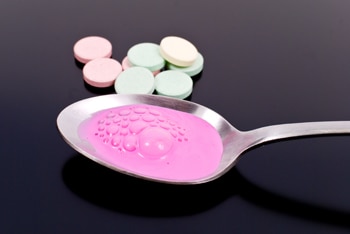Treatment of Indigestion
How do doctors treat indigestion?
Treatment for indigestion depends on the cause and may include
- over-the-counter and prescription medicines
- changing what you eat and drink
- psychological therapies
Over-the-counter and prescription medicines
You can buy many medicines to treat indigestion without a prescription, such as antacids, H2 blockers, or proton pump inhibitors. However, if your indigestion lasts longer than 2 weeks, you should see your doctor. Your doctor may prescribe acid-suppressing medicines that are stronger than the ones you can buy, antibiotics, prokinetics, or psychological medicines.
Antacids. Doctors often first recommend antacids—over-the-counter medicines that neutralize acids in your stomach. Antacids include
- calcium carbonate (Rolaids, Tums)
- loperamide (Imodium)
- simethicone (Maalox, Mylanta)
- sodium bicarbonate (Alka-Seltzer)

Antibiotics. To treat a Helicobacter pylori (H. pylori) infection, your doctor will prescribe antibiotics—medicines that kill bacteria. He or she will prescribe at least two of the following:
- amoxicillin (Amoxil)
- clarithromycin (Biaxin)
- metronidazole (Flagyl)
- tetracycline (Sumycin)
- tinidazole (Tindamax)
H2 blockers. H2 blockers are medicines that decrease the amount of acid your stomach produces. H2 blockers provide short-term or on-demand relief for many people with indigestion. You can buy an H2 blocker or your doctor can prescribe one. H2 blockers include
- cimetidine (Tagamet HB)
- famotidine (Pepcid AC)
- nizatidine (Axid AR)
- ranitidine (Zantac 75)
Proton pump inhibitors (PPIs). PPIs are most effective in treating indigestion if you also have heartburn. You can buy some PPIs or your doctor can prescribe one. PPIs include
- esomeprazole (Nexium)
- lansoprazole (Prevacid)
- omeprazole (Prilosec, Zegerid)
- pantoprazole (Protonix)
- rabeprazole (AcipHex)
Prokinetics. Prokinetics help your stomach empty faster. Prescription prokinetics include
- bethanechol (Urecholine)
- metoclopramide (Reglan)
Changes in what you eat and drink
Your doctor may recommend that you avoid certain foods and drinks that may cause indigestion or make your symptoms worse, such as
- alcoholic beverages
- carbonated, or fizzy, drinks
- foods or drinks that contain caffeine
- foods that contain a lot of acid, such as tomatoes, tomato products, and oranges
- spicy, fatty, or greasy foods
Psychological therapies
Your doctor may recommend a type of psychological therapy called “talk therapy” to help treat anxiety and depression that may be causing your indigestion. If stress is causing your indigestion, your doctor may recommend ways to help you reduce your stress, such as meditation, relaxation exercises, or counseling. Talk therapy can also help you learn how to reduce your stress.
What can I do to help prevent indigestion?
In addition to making changes in what you eat and drink, you can help prevent indigestion by making lifestyle changes such as
- avoiding exercise right after eating
- chewing food carefully and completely
- losing weight
- not eating late-night snacks
- not taking a lot of nonsteroidal anti-inflammatory drugs
- quitting smoking
- trying to reduce stress in your life
- waiting 2 to 3 hours after eating before you lie down
This content is provided as a service of the National Institute of Diabetes and Digestive and Kidney Diseases
(NIDDK), part of the National Institutes of Health. NIDDK translates and disseminates research findings to increase knowledge and understanding about health and disease among patients, health professionals, and the public. Content produced by NIDDK is carefully reviewed by NIDDK scientists and other experts.

